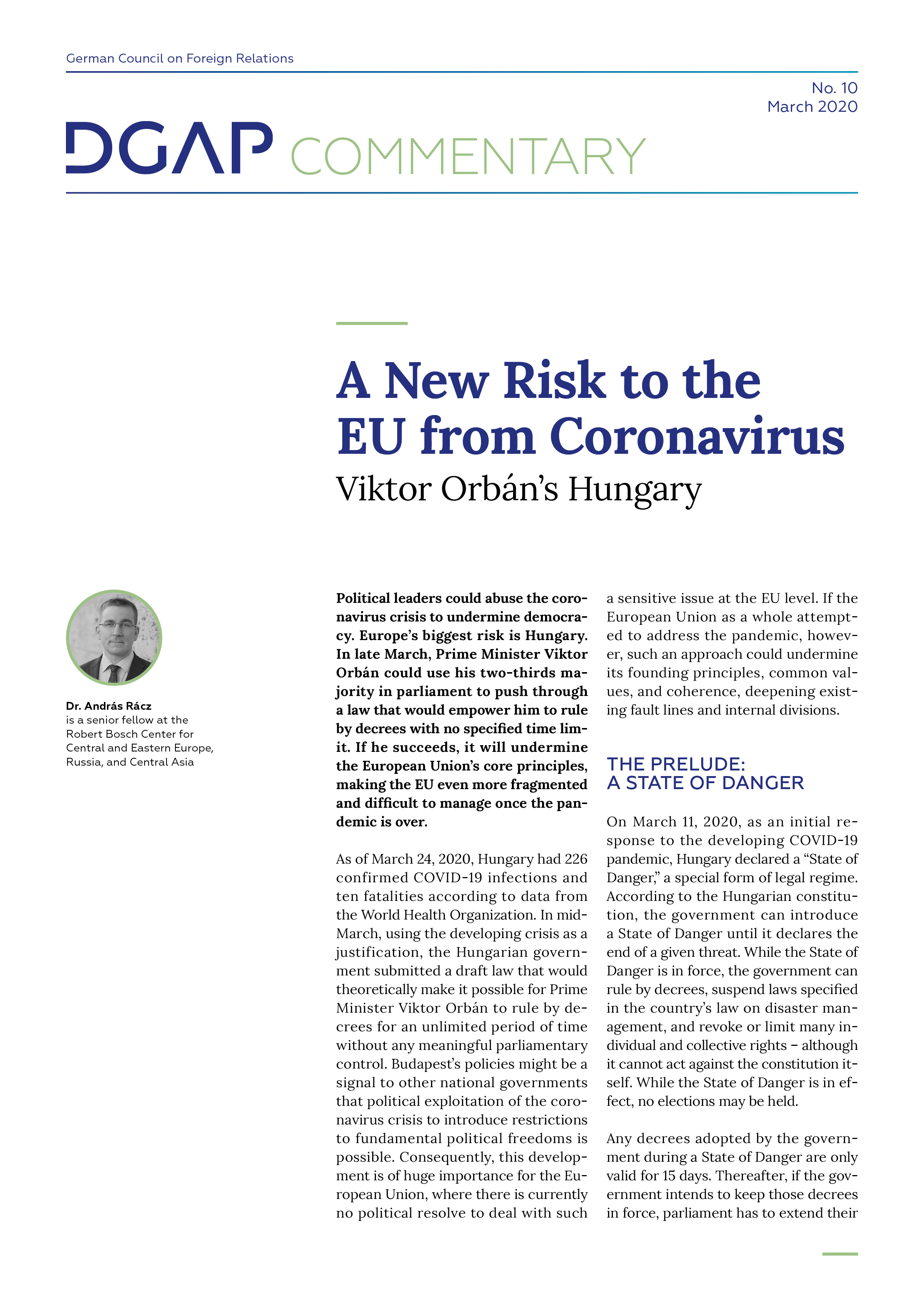As of March 24, 2020, Hungary had 226 confirmed COVID-19 infections and ten fatalities according to data from the World Health Organization. In mid-March, using the developing crisis as a justification, the Hungarian government submitted a draft law that would theoretically make it possible for Prime Minister Viktor Orbán to rule by decrees for an unlimited period of time without any meaningful parliamentary control. Budapest’s policies might be a signal to other national governments that political exploitation of the coronavirus crisis to introduce restrictions to fundamental political freedoms is possible. Consequently, this development is of huge importance for the European Union, where there is currently no political resolve to deal with such a sensitive issue at the EU level. If the European Union as a whole attempted to address the pandemic, however, such an approach could undermine its founding principles, common values, and coherence, deepening existing fault lines and internal divisions.
The Prelude: A State of Danger
On March 11, 2020, as an initial response to the developing COVID-19 pandemic, Hungary declared a “State of Danger,” a special form of legal regime. According to the Hungarian constitution, the government can introduce a State of Danger until it declares the end of a given threat. While the State of Danger is in force, the government can rule by decrees, suspend laws specified in the country’s law on disaster management, and revoke or limit many individual and collective rights – although it cannot act against the constitution itself. While the State of Danger is in effect, no elections may be held.
Any decrees adopted by the government during a State of Danger are only valid for 15 days. Thereafter, if the government intends to keep those decrees in force, parliament has to extend their validity for another 15 days by a two-thirds majority, and thereafter again and again. At present, Viktor Orbán’s coalition has a two-thirds majority so that, as long as parliament is operational, it should easily be able to extend the validity of the decrees it proposes. Still, the 15-day limit constitutes an important check on executive power.
Another check is that Hungary’s constitutional court has the right to oversee decisions made by the government during a State of Danger. In the country’s contemporary political context, however, the constitutional court hardly offers a counterbalance to the government. Since Orbán took power in 2010, he has used the two-thirds majority he has had in parliament for most of his tenure to weaken the power of the court and fill it with government loyalists, some of whom are not even constitutional lawyers.
The Empowerment Law
On March 20, 2020 – referring to the need to efficiently combat COVID-19 – Orbán’s government submitted a draft law to parliament that would abolish the 15-day limitation on the validity of decrees adopted during a State of Danger. Because Hungary’s law on disaster management was mostly written to address floods and industrial disasters rather than a pandemic, its legal system is indeed struggling to create the necessary measures to fully cover issues related to the current crisis. However, this new law, which is widely referred to as the “Empowerment Law,” gives a too heavy-handed answer to legal problems that unquestionably exist.
If adopted, the Empowerment Law would give Prime Minster Orbán largely unchecked power without any definite time limit by doing three main things. First, it would make decrees enacted during a State of Danger valid until either the government or the parliament rules that they are no longer necessary. Currently, both are firmly controlled by Orbán’s Fidesz Party. Moreover, even if neither body can come to a formal decision, decrees made in this State of Danger will stay in force after the COVID-19 crisis is over. Second, the Empowerment Law would make it possible for the government to suspend any laws – not only the ones specified in the law on disaster management – except for the constitution. Hence, by using the current pandemic as a pretext, the government could regulate all fields of life in the country by decrees and without any parliamentary control. And third, the law would modify Hungary’s criminal code, decisively widening the definition of fearmongering and spreading false information, as well as increasing their punishment to one to five years imprisonment. Both opposition and civil society forces are concerned that this modification would make it possible for the government to massively crack down on media critical of its agenda.
The government had initially wanted to get this Empowerment Law adopted with extra urgency on March 24. Because an extra urgency procedure requires more votes to support it, the opposition could then have blocked it. The ruling coalition is now planning to have parliament vote on the Empowerment Law in a normal procedure at the end of March, when its two-thirds majority is likely to result in it being enacted.
Opposition worries have been fueled by the example set by a law on the “state of crisis caused by mass migration,” which was introduced and codified as a response to developments in 2015. Although in the four years after the crisis peaked barely any migrants have tried to come to Hungary, this “state of crisis” continues to be kept in force today. Not surprisingly, the opposition is concerned about the ramifications of Orbán’s proposed Empowerment Law.
Recommendations for the EU and Germany
Though certain illiberal tendencies and rule-of-law issues can be seen in other countries of Central Europe, Hungary’s response to the pandemic is unique. So far, none of its three partners in the Visegrád Group has decided to widen the constitutional framework it currently has to manage emergency situations – despite the fact that, at this writing, the number of reported cases of COVID-19 in Poland and the Czech Republic are considerably higher than in Hungary.
If other countries would follow Hungary’s example, however, the European Union could quickly get to a point where a fight against COVID-19 at the EU level could result in the introduction of serious, lasting constraints of fundamental political freedom and human rights, thus endangering the very principles upon which the EU was founded.
The Commission should review all restrictions on civil liberties made in the EU in response to the crisis.
Consequently, the European Union should clearly state, ideally at the highest level of the European Council, that any and all restrictions of civil liberties that are inevitable to combating the pandemic are only justified until they can be phased out as soon as the situation allows. This especially applies to any modifications of democratic decision-making within member states and to all restrictions on freedom of movement – from local or national curfews to measures affecting the entire Schengen Area.
With respect to Hungary, the rule by decree – practically unlimited in terms of time – that could result from Orbán’s Empowerment Law cannot in any way be justified by the COVID-19 crisis. It would be a clear violation of Article 7 of the Treaty on the European Union, which aims to ensure that all EU countries respect common values, including the rule of law. Hence, current developments in Hungary constitute a strong argument for linking rule-of-law issues to EU budgetary support.
Given the Hungarian prime minister’s recent moves, it is important for both the EU and Germany to prepare for an attempt by Orbán at keeping extraordinary powers even after the end of the pandemic. Though this concern might seem to be a distant one at present, the possibility indeed exists. Although an initial approach to Budapest should be constructive and not assume the worst, cooperation should be accompanied by thorough monitoring in order to ensure that any extra powers are not misused and restrictions to civil liberties are warranted. Monitoring should be conducted by both the European Commission and the Council in the framework of the ongoing Article 7 proceedings that were initiated by the European Parliament in September 2018.
In addition to examining the worrying developments in Hungary, the European Commission should also review all restrictions on civil liberties made throughout the European Union in response to the COVID-19 crisis. It should include these observations in the reports on all EU member states that are due in the second semester of 2020 under Germany’s EU presidency.

